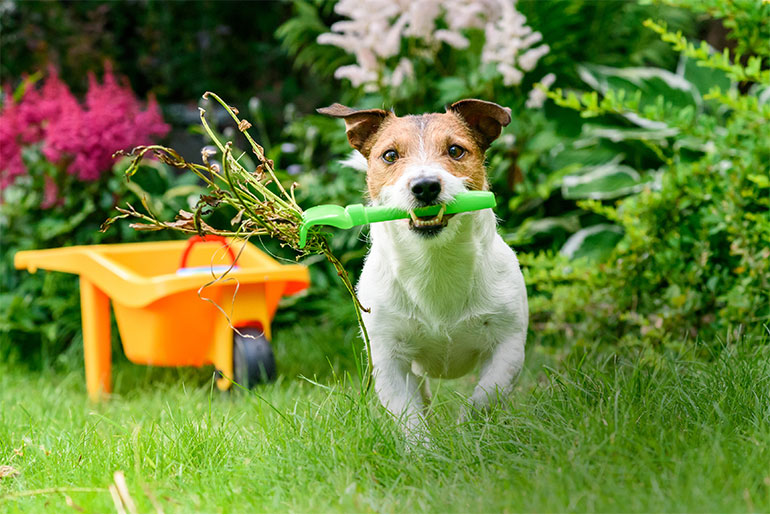No season beckons quite like spring in the Northeast. The air is sweeter, signs of nature’s beauty unfurl daily and we can’t get outside fast enough, often with furry friends in tow. Whether in the park or just your own backyard, a savvy pet parent should be aware of the hidden perils that can cause disruption to an animal’s health, from mild gastrointestinal flareups and allergy symptoms to life-threatening issues.
Educating yourself and preparation are keys to success, so first we turned to a knowledgeable, third-generation veterinary practitioner — Jessica Melman, D.V.M., of Bespoke Veterinary Services — to weigh in on toxins, pests and allergies. In our conversation with Melman, who offers custom, mobile veterinary services throughout Fairfield County, it becomes apparent that there is much more outdoors to be wary of than your pooch munching on a random flower.
First, at home, there’s the environment at large. Her recommendation? “Do not avoid treating your property with pesticides. You may be doing your pet more harm than good if you don’t,” she says. The benefits of mitigating ticks and other harmful insects far outweigh the need to treat an animal once it has contracted Lyme’s disease or heartworm. She suggests taking the advice of an expert landscaper or lawn service professional for guidance, being sure to inform him that you have pets. He will recommend the right course of treatment and advise on how long to keep pets off treated areas.
When it comes to getting into garden trouble, puppies lead the list, but adult dogs and cats are also attracted to a host of plants and garden materials, from sticks and mulch to flowers and grass. Sometimes, Melman says, you won’t see symptoms of an adverse reaction for a while. Often, your pets will likely ingest something while you’re not looking, so you won’t necessarily know the cause of the problem. Even with a watchful eye, their quick actions may go unnoticed.
“I had a case last week where a dog ate something unknown and then the owner observed her pet repeatedly making a swallowing motion. I advised her to offer water to clear the mouth of any irritation, and even offering a small amount of bland food can help, too.” But at any sign of distress, Melman advocates checking with your veterinarian for the proper course of action. Other symptoms may be present, including the obvious ones like vomiting and diarrhea, and the not so obvious ones like excessive drooling, smacking the lips together or trying to bring something up.
There are far too many plants and flowers that can cause GI upset and other issues to list them all here, ranging from aloe vera and daffodils to hollies and hydrangea. In fact, a deep dive on the ASPCA website reveals a copious list of toxic plants and plant materials, with 416 varieties of plants are listed under the canine section alone. (See sidebar.)
By far, Melman says, mushrooms are among the most threatening toxins in the garden and surrounding woodlands. And with so many varieties in nature, some quite toxic, they can produce harmful effects on our pets, so best to steer your pets clear of potentially dangerous fungi. Other plants and garden materials like mulch are attractive to animals and do pose some health risks, but mostly, these will result in a mild to moderate GI upset.
Other considerations for pets spending time outdoors are allergies and insect bites. Like humans, dogs, too, can have several allergies, but their symptoms may be quite different from ours. “We will have itchy, watery eyes and sneeze, but dogs and cats will manifest allergic reactions through their skin,” Melman says. Accordingly, we may see pets doing a lot of itching and licking. Brown staining, caused by pet saliva and seen around the paw area, is usually a sign of heavy licking. Also, look for excessive ear and body itching, patchy hair loss, or the animal rubbing his head on the ground. All point to signs of irritation from allergic reactions, like dermatitis and ear infections.
Again, leave it to the professionals to diagnose and advise the right course of action for your pet, be it topical, oral or both, depending on the cause and severity. “If you know your pet has allergies, you can get ahead of it beforehand,” Melman says. She suggests addressing these issues ahead of the peak season with your vet, who can prescribe some preemptive remedies like allergy injections or medicated shampoos and other treatments to keep pets more comfortable before problems start.
Lastly, animals, especially those who go outdoors, should be treated for fleas and ticks, but this will not guarantee immunity to the occasional insect bite. Look for a swollen muzzle or red spots, which are indicators of allergic reactions to bites. “Dogs, in particular, love rolling around on the ground,” Melman adds, “and they can get bitten by spiders and other garden insects.”
Still, none of this should be a deterrent to enjoying walks, trails and your own backyard with your pets. Proper education, prevention and keen observation of their behavior should ensure a happy and safe time for all.
For more, visit bespokevetservice.com.
Be informed about pet poisons
ASPCA
The ASPCA compiles an annual list of the Top Ten toxins for pets and runs a campaign to educate the public about these dangers every March during National Poison Prevention Week.
The organization provides a service to pet owners via a toll-free number to its Animal Poison Control Center (888-426-4435) that provides 24/7 access to trained veterinary staff to guide you through toxic reactions. Its website contains exhaustive lists of substances beyond the garden that can be poisonous to animals. aspca.org/news/official-top-10-pet-toxins-2020
CORNELL UNIVERSITY VETERINARY SPECIALISTS
This organization offers 24/7 in-person emergency care and specialty veterinary services at its facility in Stamford. CUVS also offers online education animal wellness webinars on topics ranging from pet first aid and CPR to more acute illnesses. cuvs.org/





